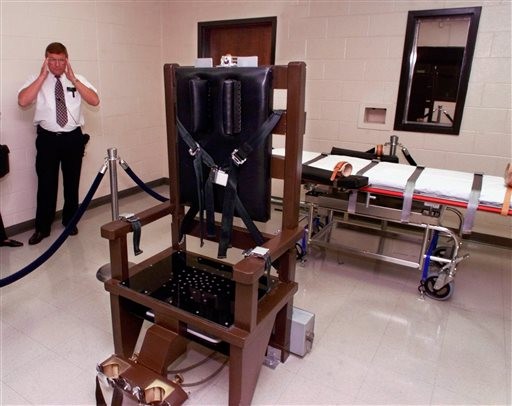South Carolina mulls electric chair as option for executions
No lethal injection drugs available for 37 on death row; 1 killed Sumter sergeant
The Associated Press
COLUMBIA - South Carolina once had one of the country's highest rates of execution, even putting two prisoners to death in one night.
But now the state hasn't executed a prisoner in nine years and currently lacks the drugs to carry out lethal injections for any of the 37 inmates on the state's death row, one of whom was convicted of killing a Sumter County sergeant.
Some lawmakers are pushing to give the state an option to begin executing prisoners again by giving them at least for now no choice but to go to the electric chair.
"We have to have a method in which to carry out the sentences of the court," said Republican Rep. Eddie Tallon, a retired state agent from Spartanburg who was the lead investigator in the case that sent South Carolina serial killer Pee Wee Gaskins to the electric chair in 1991.
Currently, condemned South Carolina prisoners have a choice between lethal injection or electrocution, with lethal injection as the default if they do not pick.
The bill approved by the House Judiciary Committee on Tuesday forces inmates to be electrocuted if lethal injection is not available, like the current situation where South Carolina's supply of lethal injection drugs expired and no pharmaceutical companies will sell them any more without a guarantee they won't be publicly identified. The proposal now heads to the House floor.
Gaskins roamed Sumter, Clarendon, Florence and Williamsburg counties and was arrested in the mid-1970s for murder. He was known for torturing and mutilating his victims before killing them.
He claimed in his autobiography he killed as many as 110 people. The Florence County native was credited with 14 murders when he was put to death, according to archival reports in The Sumter Item. One of those is thought to have been Peggy Cuttino, the 13-year-old daughter of a former state representative who disappeared while walking to Willow Drive School in 1970. Her mutilated body was found in Manchester State Forest 12 days later by motorcyclists.
A Georgia mechanic was convicted of her killing in 1973, but many had doubts about his guilt, fueled in part by Gaskins' claim in 1978 under truth serum that he killed her.
Opponents of the bill said electrocution is barbaric, and South Carolina acknowledged that when it allowed lethal injection in 1995.
Democratic Rep. Justin Bamberg said if the bill passed, the state would treat inmates worse than dogs because while lethal injection is a humane way to euthanize an animal, other ways are not.
"If you were to take that dog and throw it into a high-voltage power line to electrocute it, you'd get hit with animal cruelty," he said.
At least one Republican with an intimate knowledge of the legal issues involved in capital punishment isn't sure South Carolina needs to go back to the electric chair.
"Death by electrocution, like Rep. Bamberg said, is just a very cruel way to die," said Republican Rep. Gary Clary of Pickens, a retired judge who presided over the trials of two current death row inmates and one who has been executed.
Clary also said South Carolina would invite lawsuits and several more years of appeals from death row inmates over whether it violated their rights to change the method of execution while they awaited punishment.
"We're going to certainly improve the economy for lawyers in the state on these criminal appeals, which will basically be funded by the Legislature," Clary said.
But supporters of the bill said they aren't changing the sentence, just how it is carried out. And the victims and their friends and families deserve a chance to have that sentenced carried out, said Rep. Peter McCoy Jr., a Republican from Charleston who has been nominated to be South Carolina's next U.S. Attorney.
"We need to keep in mind the victims who do suffer these heinous deaths is of utmost importance when discussing this," McCoy said.
The Senate has already passed the bill but included an option allowing death by firing squad that supporters of the proposal said was put in to derail the legislation. House members removed the firing squad option, but that means the bill would have to pass the Senate again.
There is at least one other bill to help restart executions by allowing any company providing the lethal injection drugs to remain secret. That proposal hasn't been considered.
From 1995 to 2005, South Carolina executed 31 inmates. In the 15 years since, the state has carried out just six executions and none since 2011.
Since lethal injection was introduced in 1995, only three inmates have picked the electric chair instead.
The lack of execution drugs is clearing out death row in a different way. There was once close to 70 inmates awaiting a death sentence. But as some inmates win new, lesser sentences and more appeals, prosecutors aren't seeking death as much.
In 2019, the state got its first two new death row inmates in five years. Prosecutors in recent years have accepted plea deals to life without parole for a man who admitted killing seven people and in deaths of police officers, which used to be almost unquestioned death penalty cases, citing the state's failure to carry out executions.
One of those cases came from Sumter County and is the most recent death row inmate who would have been executed.
Bobby Wayne Stone was sentenced to death in 1997 for the 1996 killing of Sumter County Sheriff's Sgt. Charlie Kubala, but his execution that was scheduled in 2017 has been delayed in response to a court order from his attorneys and because of the state's lack of the drugs needed.
At the time, Stone would have been the first execution in South Carolina in six years.
Sumter Item executive editor Kayla Green contributed to this report.
More Articles to Read

